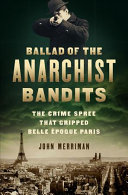2018 School Spending Survey Report
Ballad of the Anarchist Bandits: The Crime Spree That Gripped Belle Époque Paris
Nation: Perseus. Oct. 2017. 336p. illus. notes. bibliog. index. ISBN 9781568589886. $28; ebk. ISBN 9781568589893. HIST
COPY ISBN
VERDICT Merriman's especially timely work gives us a robust understanding of the revolutionary thought process, encouraging us to question what lies beneath a society's shining surface.
RELATED
ALREADY A SUBSCRIBER? LOG IN
We are currently offering this content for free. Sign up now to activate your personal profile, where you can save articles for future viewing




Comment Policy:
Comment should not be empty !!!